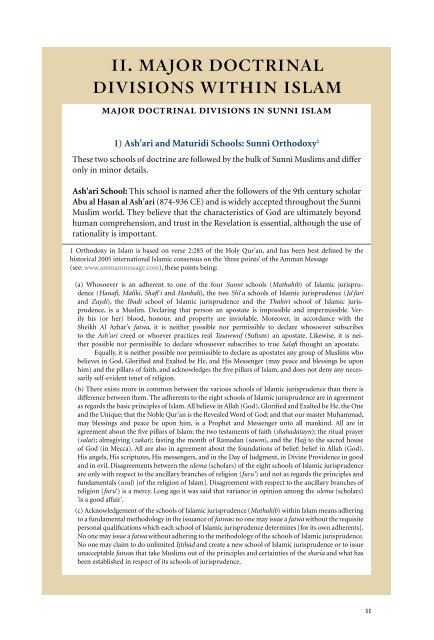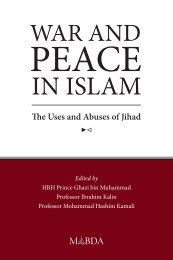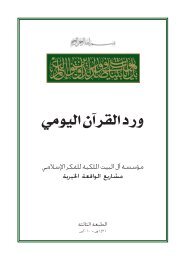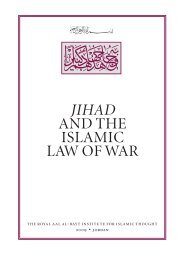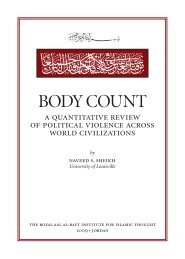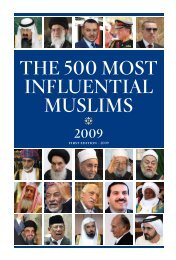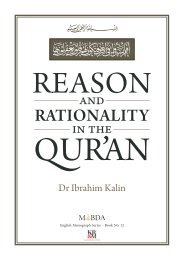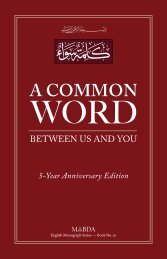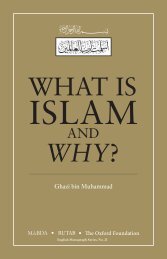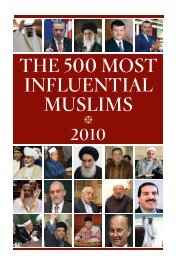the 500 most influential muslims - The Royal Islamic Strategic ...
the 500 most influential muslims - The Royal Islamic Strategic ...
the 500 most influential muslims - The Royal Islamic Strategic ...
You also want an ePaper? Increase the reach of your titles
YUMPU automatically turns print PDFs into web optimized ePapers that Google loves.
ii. major doctrinal<br />
divisions within islam<br />
major doctrinal divisions in sunni islam<br />
1) Ash'ari and Maturidi Schools: Sunni Orthodoxy 1<br />
<strong>The</strong>se two schools of doctrine are followed by <strong>the</strong> bulk of Sunni Muslims and differ<br />
only in minor details.<br />
Ash'ari School: This school is named after <strong>the</strong> followers of <strong>the</strong> 9th century scholar<br />
Abu al Hasan al Ash'ari (874-936 CE) and is widely accepted throughout <strong>the</strong> Sunni<br />
Muslim world. <strong>The</strong>y believe that <strong>the</strong> characteristics of God are ultimately beyond<br />
human comprehension, and trust in <strong>the</strong> Revelation is essential, although <strong>the</strong> use of<br />
rationality is important.<br />
1 Orthodoxy in Islam is based on verse 2:285 of <strong>the</strong> Holy Qur’an, and has been best defined by <strong>the</strong><br />
historical 2005 international <strong>Islamic</strong> consensus on <strong>the</strong> 'three points' of <strong>the</strong> Amman Message<br />
(see: www.ammanmessage.com), <strong>the</strong>se points being:<br />
(a) Whosoever is an adherent to one of <strong>the</strong> four Sunni schools (Mathahib) of <strong>Islamic</strong> jurisprudence<br />
(Hanafi, Maliki, Shafi‘i and Hanbali), <strong>the</strong> two Shi‘a schools of <strong>Islamic</strong> jurisprudence (Ja‘fari<br />
and Zaydi), <strong>the</strong> Ibadi school of <strong>Islamic</strong> jurisprudence and <strong>the</strong> Thahiri school of <strong>Islamic</strong> jurisprudence,<br />
is a Muslim. Declaring that person an apostate is impossible and impermissible. Verily<br />
his (or her) blood, honour, and property are inviolable. Moreover, in accordance with <strong>the</strong><br />
Sheikh Al Azhar’s fatwa, it is nei<strong>the</strong>r possible nor permissible to declare whosoever subscribes<br />
to <strong>the</strong> Ash'ari creed or whoever practices real Tasawwuf (Sufism) an apostate. Likewise, it is nei<strong>the</strong>r<br />
possible nor permissible to declare whosoever subscribes to true Salafi thought an apostate.<br />
Equally, it is nei<strong>the</strong>r possible nor permissible to declare as apostates any group of Muslims who<br />
believes in God, Glorified and Exalted be He, and His Messenger (may peace and blessings be upon<br />
him) and <strong>the</strong> pillars of faith, and acknowledges <strong>the</strong> five pillars of Islam, and does not deny any necessarily<br />
self-evident tenet of religion.<br />
(b) <strong>The</strong>re exists more in common between <strong>the</strong> various schools of <strong>Islamic</strong> jurisprudence than <strong>the</strong>re is<br />
difference between <strong>the</strong>m. <strong>The</strong> adherents to <strong>the</strong> eight schools of <strong>Islamic</strong> jurisprudence are in agreement<br />
as regards <strong>the</strong> basic principles of Islam. All believe in Allah (God), Glorified and Exalted be He, <strong>the</strong> One<br />
and <strong>the</strong> Unique; that <strong>the</strong> Noble Qur’an is <strong>the</strong> Revealed Word of God; and that our master Muhammad,<br />
may blessings and peace be upon him, is a Prophet and Messenger unto all mankind. All are in<br />
agreement about <strong>the</strong> five pillars of Islam: <strong>the</strong> two testaments of faith (shahadatayn); <strong>the</strong> ritual prayer<br />
(salat); almsgiving (zakat); fasting <strong>the</strong> month of Ramadan (sawm), and <strong>the</strong> Hajj to <strong>the</strong> sacred house<br />
of God (in Mecca). All are also in agreement about <strong>the</strong> foundations of belief: belief in Allah (God),<br />
His angels, His scriptures, His messengers, and in <strong>the</strong> Day of Judgment, in Divine Providence in good<br />
and in evil. Disagreements between <strong>the</strong> ulema (scholars) of <strong>the</strong> eight schools of <strong>Islamic</strong> jurisprudence<br />
are only with respect to <strong>the</strong> ancillary branches of religion (furu') and not as regards <strong>the</strong> principles and<br />
fundamentals (usul) [of <strong>the</strong> religion of Islam]. Disagreement with respect to <strong>the</strong> ancillary branches of<br />
religion (furu‘) is a mercy. Long ago it was said that variance in opinion among <strong>the</strong> ulema (scholars)<br />
'is a good affair'.<br />
(c) Acknowledgement of <strong>the</strong> schools of <strong>Islamic</strong> jurisprudence (Mathahib) within Islam means adhering<br />
to a fundamental methodology in <strong>the</strong> issuance of fatwas: no one may issue a fatwa without <strong>the</strong> requisite<br />
personal qualifications which each school of <strong>Islamic</strong> jurisprudence determines [for its own adherents].<br />
No one may issue a fatwa without adhering to <strong>the</strong> methodology of <strong>the</strong> schools of <strong>Islamic</strong> jurisprudence.<br />
No one may claim to do unlimited Ijtihad and create a new school of <strong>Islamic</strong> jurisprudence or to issue<br />
unacceptable fatwas that take Muslims out of <strong>the</strong> principles and certainties of <strong>the</strong> sharia and what has<br />
been established in respect of its schools of jurisprudence.<br />
11


